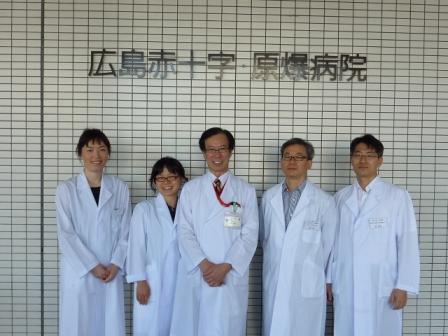Over the Years
Home > Over the Years > A Medical Delegation from Korea Invited for Training
A Medical Delegation from Korea Invited for Training
List of Trainees:
Internal Medicine Department, Incheon Red Cross Hospital
Seon-Young Jeon, Director
Department of Anesthesia and Pain Medicine, Seoul Red Cross Hospital
Jie-Hyang Lim, Director
Family Medicine, Busan Medical Center
Min-Kyu Kang, Instructor
Department of Therapeutic Radiology and Oncology,
Yeungnam University College of Medicine

Dr. Lim, Dr. Jeon, Dr. Kenichi Arita (Director of Department of Respiratory Disease, Hiroshima Red Cross Hospital and Atomic-bomb Survivors Hospital and Executive Secretary of HICARE), Dr. Son and Dr. Kang
Period of Training:
Training Organizations (in order of visits):
Hiroshima University Research Institute for Radiation Biology and Medicine
Hiroshima Red Cross Hospital & Atomic-bomb Survivors Hospital
Hiroshima Atomic Bomb Casualty Council
Radiation Effects Research Foundation
Hiroshima Peace Memorial Museum etc.
Feedback:
[Dr. Min-Soo Son]
I have known the fact that Hiroshima and Nagasaki were attacked by atomic bombs since I was a student at elementary school. However, I did not pay attention to the fact for more than 30 years and no one told me the details of it. I understood specifically how terrible atomic weapons were and why people oppose to nuclear weapons so rigorously only after visiting Hiroshima Peace Memorial Museum in this training.
In the training, I learned that the degree of severity of radiation disorder in the chronic phase is lower than those in the acute phase and that intensity of the effects on the second generation of A-bomb survivors is less than those on people directly exposed to radiation. This knowledge is the most important benefit that I gained from this training. I highly appreciate HICARE's dedicated efforts to support A-bomb survivors.
The most important thing is to prevent another nuclear calamity from occurring. To develop this awareness, more people should visit Hiroshima.
[Dr. Seon-Young Jeon]
I had been indifferent to the damage caused by atomic weapons and problems of A-bomb victims before receiving this training, even though I am a doctor working at a medical institute agreeing to examine A-bomb survivors living in Korea. However, through the HICARE training, I have learned detailed information on how many people were killed by the A-bombs and have been suffering from disorders and social discrimination caused by them. Reaffirming the importance of eliminating nuclear weapons, that are a serious threat to human beings, I now earnestly hope that the nuclear deterrence measure that uses nuclear weapons to stave off other countries' use of nuclear weapons will be replaced by three nonnuclear principles (not to make or possess nuclear weapons, and not to allow their entry into the country) in all nuclear powers, including the United States.
[Dr. Jie-Hyang Lim]
I found the pitiful fact of innocent people who were killed instantly or after a long suffering or survived but were forced to live a painful life by atomic bombing of Hiroshima and Nagasaki. The sad history of the relationship of Korea with Japan might have hampered me from considering the fact properly. I had thought that thanks to the atomic bombs Japan was made to surrender and Korea was liberated from Japan's control. However, my perspectives were totally changed after receiving this training.
In the present, when radioactive substances are used in various ways, there is a threat that innocent people may be exposed to radiation again. I now understand that I can be an A-bomb victim today when nuclear powers conduct wars around the world. I cannot forget the image of a woman who stood holding her dead child. The only solution is to establish the nuclear-free peaceful world.
I believe that the research, diagnosis systems, and education that are being developed in Hiroshima will serve the world's safety. It was my honor to participate in this training despite the short period of time. Thank you very much.
[Dr. Min-Kyu Kang]
Yeungnam University Medical Center treats many victims because the hospital is designated to support treatment of A-bomb survivors. However, I had not known what support I should provide them specifically. Through this training I found what I can do. If Korean doctors engaged in diagnosis of many A-bomb survivors have more opportunities to participate in training like HICARE's one, they would be able to deepen their understanding of atomic weapons and pay better attention to A-bomb victims.
Although the Republic of Korea National Red Cross issued a bulletin on atomic weapons, it is uncertain that doctors in designated hospitals to treat A-bomb victims know such information. (I have worked at Yeungnam University Medical Center only for one year. Before joining the hospital, I had never had a chance to examine A-bomb survivors.) In this training I dealt with A-bomb survivors for the first time. Many Korean doctors may not know specifically what they should do to help A-bomb survivors to receive health care and allowances. Therefore, if they are asked to create a document that is necessary for some procedure related to Atomic weapons by their patient, they may create it in a format used only in Korea. Publicity is needed also in this point.
Through this training, I was able to learn the outlines of the present situation of support for A-bomb survivors, exchange with other countries and undertake studies on progress being made in Japan. In particular, I was also able to gain new knowledge of DNA repair mechanisms and biological dosimetry. I had questions about the impact of my using irradiation treatment on the second generation of young patients. Although some questions were resolved during the training, I was disappointed that some questions remained unanswered. However, I believe that I will be able to find answers of these questions.
It was difficult to fully deepen my knowledge during this training because we visited many institutions in a short period of time. Therefore, I would like to participate in another training to learn in Hiroshima University and its Research Institute for Radiation Biology and Medicine.




